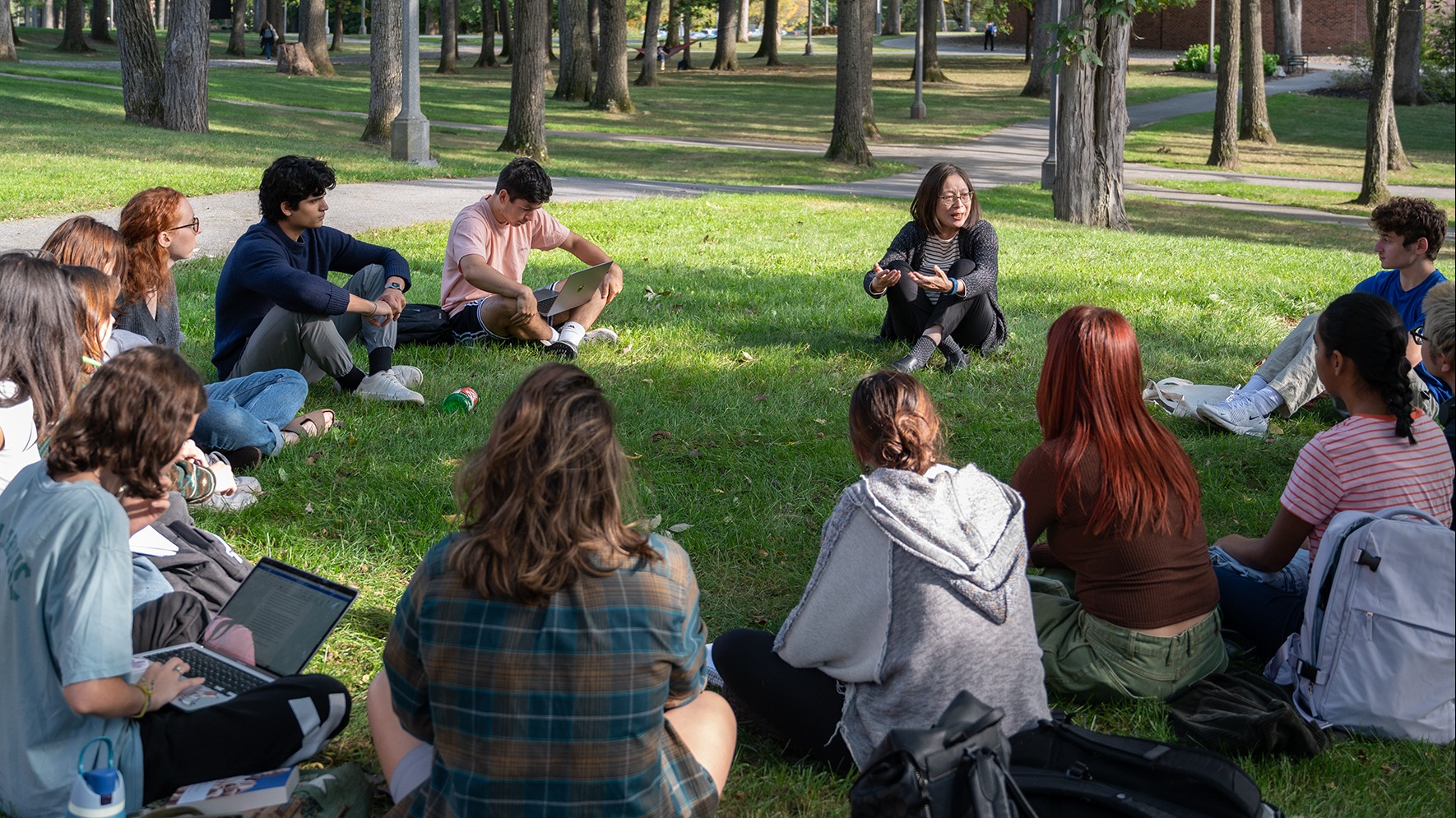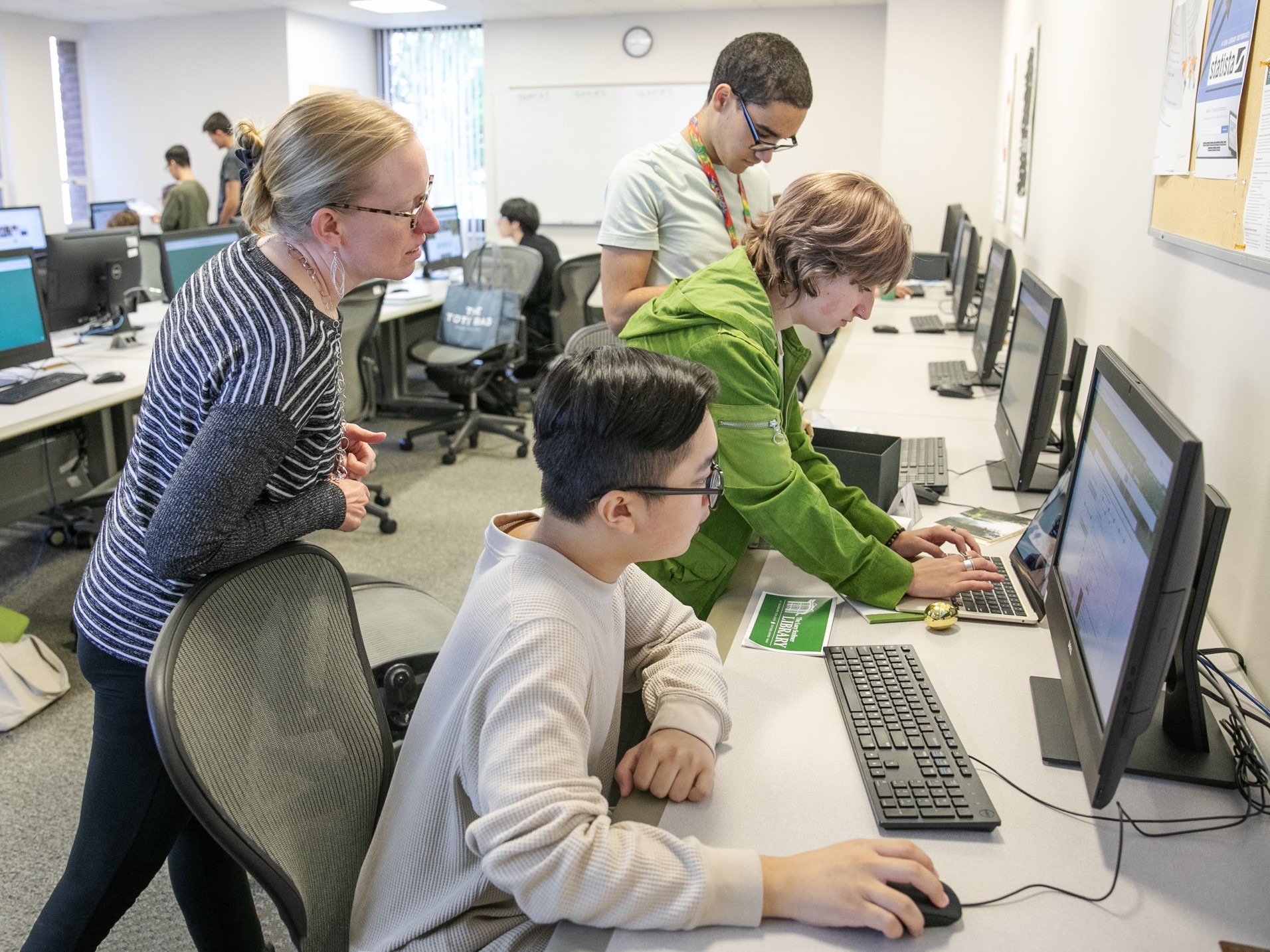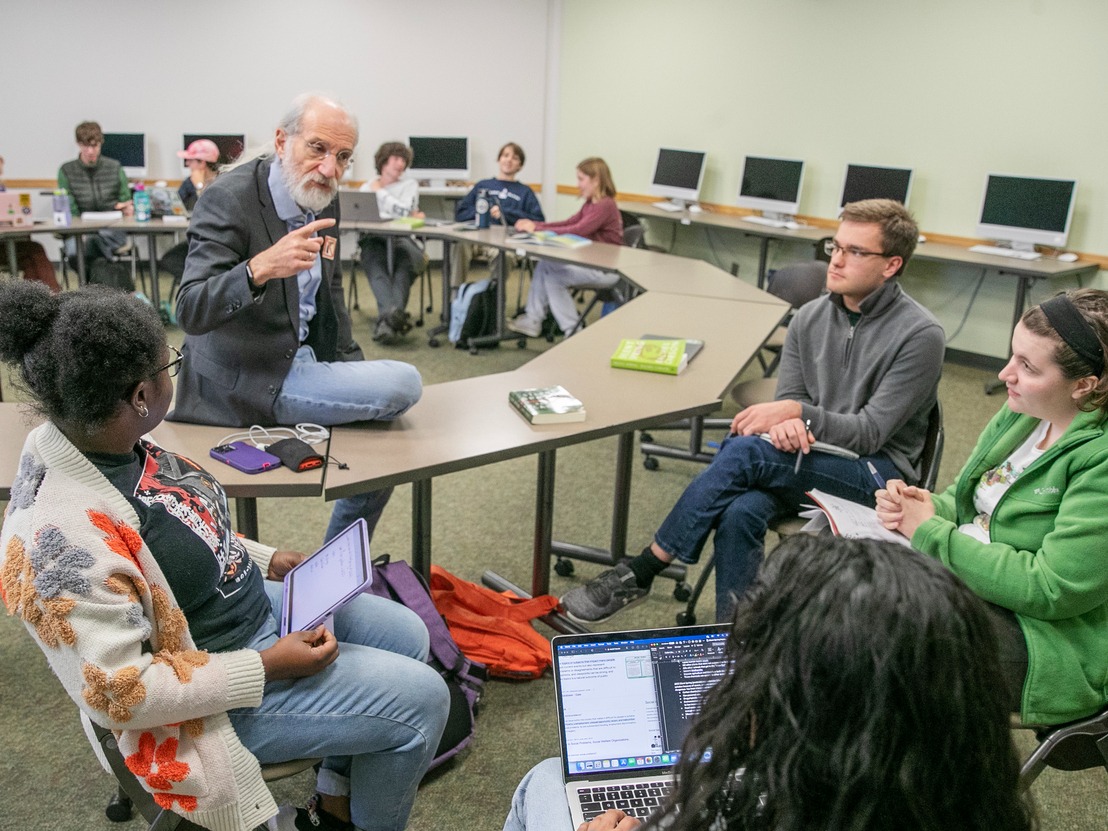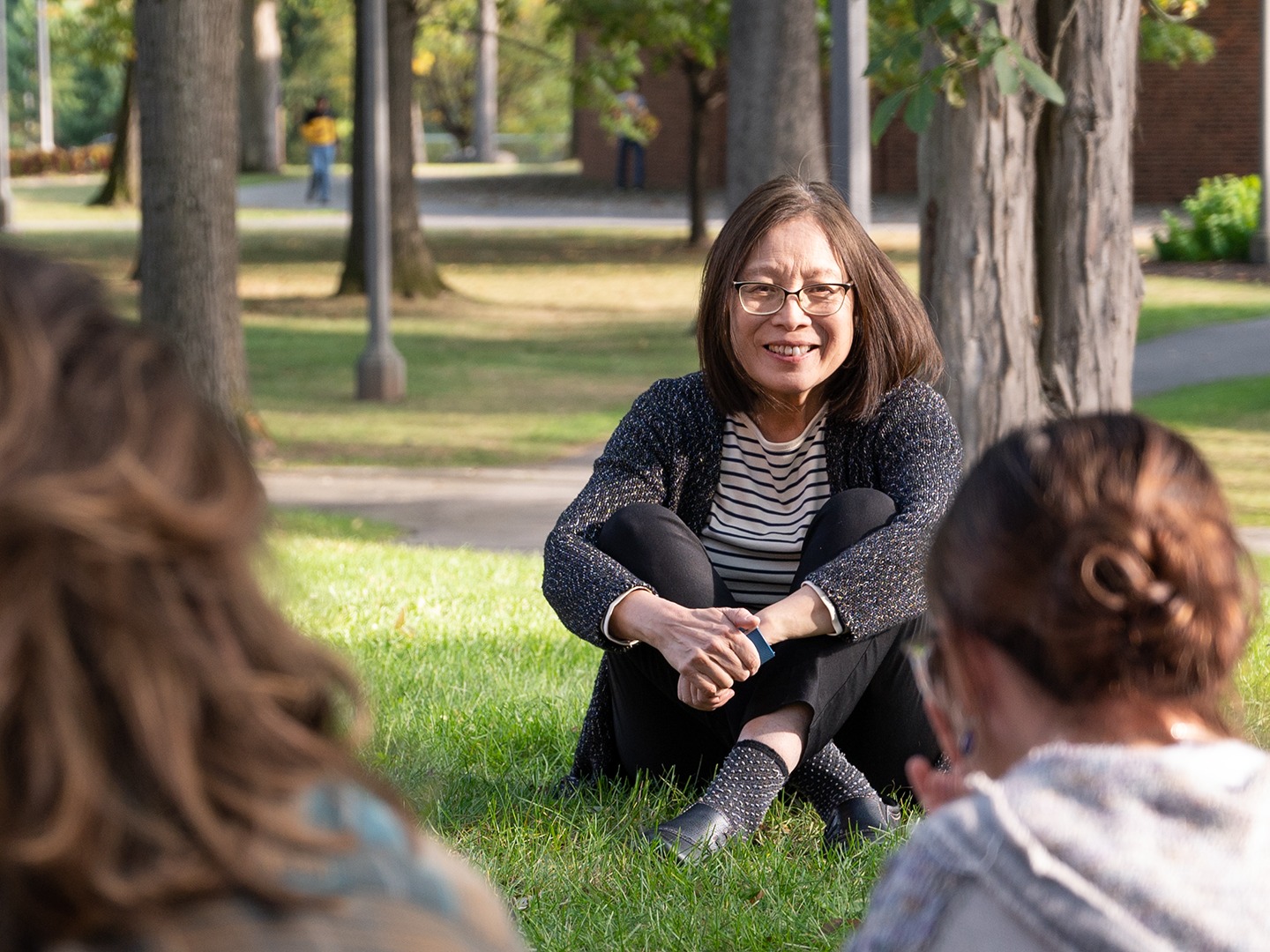Faculty and students learning together: Skidmore’s Scribner Seminars

Scribner Seminars are a staple of the Skidmore College experience. Each fall semester, professors from a variety of disciplines teach a seminar to a class of first-year students. Although the subjects of the classes are often related to their areas of study, they don’t have to be. Often you will find seminars dive into a niche that is not typically explored within a professor's discipline. Some notable seminars include Can Machines Think?, The Dancing Brain, and Weird Books. But these are only a few of almost 50 unique classes.
The seminars — the centerpiece of Skidmore’s First-Year Experience — are designed to introduce first-year students to the rigor of a college class and ease them into the more subtle aspects of the college environment. The classes also highlight the uniquely collaborative nature of teaching at Skidmore.
My first-year seminar, The Space of Modern Thought with Professor Grace Burton, was incredibly meaningful to me: I got to study every subject under the sun, connected with my classmates, and met my best friend at Skidmore. The connections I made — especially my relationship with Professor Burton — have impacted my subsequent time at Skidmore, both academically and personally.
But what do professors think of the experience?
I sat down with three professors to discuss their experiences in the Scribner Seminar. From these conversations, one thing became clear: Students aren’t the only ones who learn in a Scribner Seminar; the professors are learning, too. One seminar even inspired a book!
Dynamics of Chaos with Professor of Mathematics and FYE Director Rachel Roe-Dale

Professor Rachel Roe-Dale, who is part of the Mathematics and Statistics Department and directs Skidmore’s First-Year Experience, teaches Dynamics of Chaos. The seminar explores the mathematical concept of chaos theory.
Part of what is so engaging for professors about the Scribner Seminar is what their first-year students bring to it, and Professor Roe-Dale said that she learns something new every year.
She especially looks forward to discussing Ray Bradbury’s “A Sound of Thunder,” which delves into the butterfly effect — a concept that goes hand in hand with chaos theory. While she did not originally teach this short story when she developed the class, a student used it as a part of a final project. Professor Roe-Dale loved it so much that she decided to incorporate it into the class in future years.
She came up with the idea for the seminar after reading James Gleick’s book “Chaos: Making a New Science,” which describes chaos theory as a shift in scientific perspective. According to Professor Roe-Dale, this shift has become extremely significant for our understanding — not just of mathematics but the world. The theory has made its way into pop culture, even showing up in Michael Chrichton’s “Jurassic Park” and on an episode of “The Simpsons.”
Interdisciplinary learning is at the heart of Scribner Seminars. “One area that Skidmore does such a wonderful job at is blending the arts and sciences,” she said. The seminar gives students the confidence to connect their different interests and different disciplines, she added.
Students also read Tom Stoppard’s “Arcadia,” a play that is similarly concerned with tenets of chaos theory. It serves as an opportunity to collaborate with other departments, including the Theater Department.
"It’s the hardest class I’ve taught at Skidmore, but it’s also the most fulfilling."Rachel Roe-Dale, PROGRAM DIRECTOR FIRST YEAR EXPERIENCE AND PROFESSOR OF MATHEMATICS
Can Literature Save the Environment? with Associate Professor of English Michael Marx

Associate Professor of English Michael Marx is responsible for the creation of several environmentally focused courses in the English Department. His Scribner Seminar, Can Literature Save the Environment?, is a combination of literary studies and environmental studies. It’s an exploration of the role literature and writing can play in changing societal perspectives and ultimately promoting social action.
Professor Marx said the course also helps to dispel the myth that studying literature is somehow irrelevant in today’s world and shows its enduring power. In the seminar, books like “Silent Spring” by Rachel Carson highlight that potential.
“Not only is it a beautifully written book that brings in some nice interdisciplinary thinking, but it was really the launching point of the environmental movement and environmental thinking," he said. "We saw the creation of the Environmental Protection Agency because of a book.”
One year, he brought in a Skidmore student who had taken a temporary leave to protest tree removals out West. “That was really a very powerful moment that moved the topics that we were looking at from being simply hypothetical to suddenly being very real,” Professor Marx said. “It got them thinking: ‘Oh wait a second, could I walk in her shoes?’”
Professor Marx said nothing quite compares to the impact of the Scribner Seminar.
The course is one that I would say is exceptionally relevant and becoming even more relevant every time I teach it.Michael Marx, ASSOCIATE PROFESSOR of English and DIRECTOR of EXPOSITORY WRITING
Ideal Worlds with Professor of Chinese Language and Literature Mao Chen
Professor Mao Chen is a member of Skidmore’s Department of World Languages and Literature and teaches Chinese language and literature. According to Professor Chen, first-year students (and young people in general) are often looking for their own ideal: What makes an ideal student? What makes an ideal friend? What makes an ideal person? That's what Professor Chen’s seminar is all about.
“My doctorate is in comparative literature, so I am a comparatist and literature scholar, and what really fascinated me is that no matter what background you come from, we humans always think about this concept of the ideal,” she said.
Professor Chen and her students explore the political ideal, the cultural ideal, the economic ideal, and the scientific ideal across time and geography.
Different cultural groups and different historical moments have different dominant ideas about what is ideal. And as we get into these very deep conversations, we tend to have a very profound shift in our ways of thinking about the concept.Mao Chen, PROFESSOR OF CHINESE LANGUAGE AND LITERATURE AND THE COURTNEY AND STEVEN ROSS CHAIR IN INTERDISCIPLINARY STUDIES
Readings in the seminar include Plato’s “Republic,” the writings of Confucius, Thomas Moore’s “Utopia,” and Henry James’ “The Europeans.” Students also watch the science fiction film “Gattaca.”
For Professor Chen, it’s important that students develop critical thinking skills that will serve them throughout their time at Skidmore and beyond. As she helps them to think critically about the ideas articulated in their readings, students transition from simply answering questions to asking them.
She also mentioned that the dialogue of the classroom is always lively and engaging because each student offers something different to the conversation. With every year that she teaches the seminar, the students change, but so does the class itself.
The course finishes with a collection of essays by the Chinese American Ha Jin who, according to Professor Chen, “argues and contemplates the question: What is the ideal for a person in the 21st century, whose identity may not be easily defined by his language. What is the ideal of self?”
My takeaway
The Scribner Seminar is Skidmore’s not-so-hidden gem. It offers a legacy of intellectualism to first-year students, who are encouraged to bring their own perspectives and experiences into the classroom environment. The professors I talked to all mentioned the same thing: They learn as much from these seminars as their students do.
This is why when someone asks about the classroom experience at Skidmore, I point them toward the Scribner Seminar, where education is not simply an opportunity for students to listen, but a space for them to actively contribute to the learning of all.
I’m now a peer mentor for new students taking the same Scribner Seminar I took as a first-year student, and I can already see the exchange of information and ideas taking place; the learning is absolutely going both ways.
